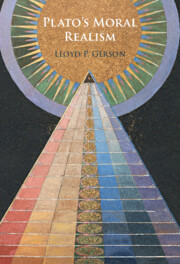Book contents
- Plato’s Moral Realism
- Plato’s Moral Realism
- Copyright page
- Dedication
- Contents
- Acknowledgments
- Chapter 1 Introduction
- Chapter 2 The Idea of the Good
- Chapter 3 Virtue, Knowledge, and the Good
- Chapter 4 Socratic versus Platonic Ethics?
- Chapter 5 Moral Responsibility
- Chapter 6 Philebus and Statesman
- Chapter 7 Morality, Religion, and Politics
- Chapter 8 Concluding Remarks
- Bibliography
- Index Locorum
- General Index
Chapter 3 - Virtue, Knowledge, and the Good
Published online by Cambridge University Press: 28 July 2023
- Plato’s Moral Realism
- Plato’s Moral Realism
- Copyright page
- Dedication
- Contents
- Acknowledgments
- Chapter 1 Introduction
- Chapter 2 The Idea of the Good
- Chapter 3 Virtue, Knowledge, and the Good
- Chapter 4 Socratic versus Platonic Ethics?
- Chapter 5 Moral Responsibility
- Chapter 6 Philebus and Statesman
- Chapter 7 Morality, Religion, and Politics
- Chapter 8 Concluding Remarks
- Bibliography
- Index Locorum
- General Index
Summary
The connection between virtue and knowledge is explored in this chapter. Various accounts of Plato’s ethics attempt to focus on the so-called Socratic paradoxes and then try to show how Plato can be seen to have constructed a psychology of action to defend these paradoxes. What is it that these paradoxes try to teach us about morality (Section 3.1)? What is “Socratic” knowledge knowledge of? How is knowledge of the Idea of the Good supposed to be relevant to morality (Section 3.2)? Virtue is a human good but so are health and wealth, friendship, and pleasure. How does Plato’s moral realism deal with these goods when they conflict (Section 3.3)? What does the practice of philosophy have to do with virtue? Can one be virtuous without being a successful philosopher (Section 3.4)? The gradations of virtue in the dialogues and their metaphysical foundation are discussed (Section 3.5). What does the Idea of the Good add to an account of human virtue or excellence (Section 3.6)? This is followed by a comparison of motivation in Plato and Kant (Section 3.7).
- Type
- Chapter
- Information
- Plato's Moral Realism , pp. 75 - 115Publisher: Cambridge University PressPrint publication year: 2023

